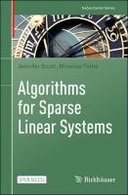Explore

Algorithms for Sparse Linear Systems
Jennifer Scott and Miroslav Tůma
2023
0 Ungluers have
Faved this Work
Login to Fave
Large sparse linear systems of equations are ubiquitous in science, engineering and beyond. This open access monograph focuses on factorization algorithms for solving such systems. It presents classical techniques for complete factorizations that are used in sparse direct methods and discusses the computation of approximate direct and inverse factorizations that are key to constructing general-purpose algebraic preconditioners for iterative solvers. A unified framework is used that emphasizes the underlying sparsity structures and highlights the importance of understanding sparse direct methods when developing algebraic preconditioners. Theoretical results are complemented by sparse matrix algorithm outlines. This monograph is aimed at students of applied mathematics and scientific computing, as well as computational scientists and software developers who are interested in understanding the theory and algorithms needed to tackle sparse systems. It is assumed that the reader has completed a basic course in linear algebra and numerical mathematics.
This book is included in DOAB.
Why read this book? Have your say.
You must be logged in to comment.
Rights Information
Are you the author or publisher of this work? If so, you can claim it as yours by registering as an Unglue.it rights holder.Downloads
This work has been downloaded 60 times via unglue.it ebook links.
- 60 - pdf (CC BY) at Unglue.it.
Keywords
- Algebra
- Algebraic Preconditioners
- Approximate Inverses
- Calculus & mathematical analysis
- Incomplete Factorizations
- Mathematics
- Mathematics & science
- Maths for scientists
- Numerical analysis
- Science: general issues
- Sparse Direct Methods
- Sparse Matrices
- thema EDItEUR::P Mathematics and Science::PB Mathematics::PBF Algebra
- thema EDItEUR::P Mathematics and Science::PB Mathematics::PBK Calculus and mathematical analysis::PBKS Numerical analysis
- thema EDItEUR::P Mathematics and Science::PD Science: general issues::PDE Maths for scientists
Links
DOI: 10.1007/978-3-031-25820-6Editions

